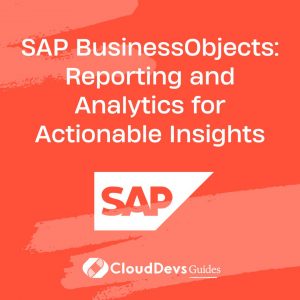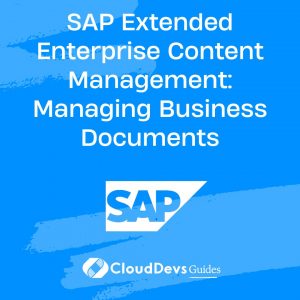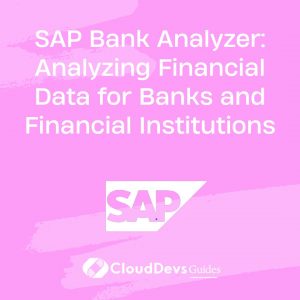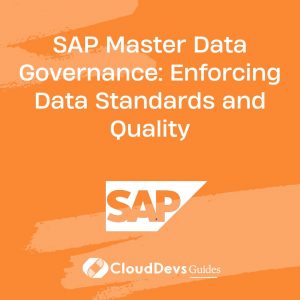SAP BusinessObjects: Reporting and Analytics for Actionable Insights
In today’s data-driven business landscape, organizations are constantly seeking ways to gain actionable insights from their data to make informed decisions. SAP BusinessObjects is a powerful suite of tools that empowers businesses to harness the full potential of their data through reporting and analytics. In this comprehensive guide, we will delve into the world of SAP BusinessObjects, exploring its key features, reporting capabilities, analytics tools, and even providing code samples to help you leverage this technology effectively.
1. Understanding the Need for Actionable Insights
In today’s fast-paced business environment, organizations are collecting massive amounts of data from various sources. While this data holds valuable information, making sense of it can be challenging without the right tools. Actionable insights are the key to making informed decisions and gaining a competitive edge.
To achieve actionable insights, organizations need to transform their raw data into meaningful information that is easily accessible, understandable, and shareable. This is where SAP BusinessObjects steps in.
2. SAP BusinessObjects: The Solution
SAP BusinessObjects is a comprehensive suite of business intelligence tools designed to help organizations extract actionable insights from their data. It offers a range of features that empower businesses to:
- Create interactive reports and dashboards
- Integrate data from various sources
- Perform advanced analytics
- Schedule and distribute reports
- Customize and extend functionality through code
Now, let’s dive deeper into the key features and capabilities of SAP BusinessObjects.
3. Key Features of SAP BusinessObjects
3.1. Reporting and Dashboards
One of the core strengths of SAP BusinessObjects is its robust reporting and dashboard capabilities. Users can create visually appealing reports and dashboards that provide a clear overview of key performance indicators (KPIs) and other critical business metrics.
Code Sample 1: Creating a Simple Report
sql SELECT ProductName, SUM(Revenue) FROM SalesData GROUP BY ProductName
3.2. Data Integration
SAP BusinessObjects allows organizations to integrate data from various sources, including databases, spreadsheets, and cloud services. This data integration capability ensures that decision-makers have access to a unified view of their data.
Code Sample 2: Data Integration Configuration
xml
<DataSource>
<Connection>
<Driver>jdbc</Driver>
<URL>jdbc:mysql://localhost:3306/salesdata</URL>
<User>username</User>
<Password>password</Password>
</Connection>
</DataSource>
3.3. Business Intelligence Platform
SAP BusinessObjects provides a scalable and secure business intelligence platform. It allows for centralized management of reports, user access control, and seamless collaboration among teams. The platform is designed to handle the needs of both small businesses and large enterprises.
4. Reporting with SAP BusinessObjects
4.1. Creating Reports
Creating reports with SAP BusinessObjects is a straightforward process. Users can choose from various report types, such as tabular reports, charts, and graphs, to visualize their data effectively.
Code Sample 3: Defining Report Structure
xml
<Report>
<Title>Sales Performance Report</Title>
<DataSource>sales_data</DataSource>
<Fields>
<Field>Name</Field>
<Field>Revenue</Field>
</Fields>
<Layout>
<Table>
<Columns>
<Column>Name</Column>
<Column>Revenue</Column>
</Columns>
</Table>
</Layout>
</Report>
4.2. Formatting and Customization
SAP BusinessObjects provides extensive formatting and customization options. Users can apply styles, colors, and themes to reports to match their corporate branding. Additionally, advanced users can write custom code to implement unique formatting requirements.
Code Sample 4: Customizing Report Formatting
css
.report-table {
font-family: Arial, sans-serif;
border-collapse: collapse;
width: 100%;
}
.report-table th, .report-table td {
border: 1px solid #dddddd;
text-align: left;
padding: 8px;
}
.report-table tr:nth-child(even) {
background-color: #f2f2f2;
}
4.3. Scheduling and Distribution
SAP BusinessObjects allows users to schedule report generation and distribution. This feature ensures that decision-makers receive up-to-date reports at predefined intervals. Reports can be delivered via email or saved to a shared location.
Code Sample 5: Scheduling Report Delivery
python
from datetime import datetime, timedelta
import schedule
def generate_daily_report():
# Code to generate and send daily report
pass
schedule.every().day.at("08:00").do(generate_daily_report)
5. Analytics with SAP BusinessObjects
5.1. Data Exploration
SAP BusinessObjects provides tools for data exploration and ad-hoc analysis. Users can create queries, perform drill-downs, and apply filters to explore data in real-time. This empowers users to discover hidden insights and trends.
Code Sample 6: Creating a Data Exploration Query
sql SELECT ProductCategory, AVG(Price) FROM ProductData WHERE Year = 2023 GROUP BY ProductCategory ORDER BY AVG(Price) DESC
5.2. Advanced Analytics
For organizations seeking to leverage advanced analytics, SAP BusinessObjects offers integration with machine learning and predictive analytics models. This allows for predictive forecasting, anomaly detection, and trend analysis.
Code Sample 7: Predictive Analytics with SAP BusinessObjects
python from sklearn.linear_model import LinearRegression # Load and preprocess data X, y = load_and_preprocess_data() # Create a linear regression model model = LinearRegression() # Train the model model.fit(X, y) # Make predictions predictions = model.predict(X)
6. Code Samples for SAP BusinessObjects
6.1. Customizing Reports with SAP Crystal Reports
SAP Crystal Reports is a part of the SAP BusinessObjects suite that specializes in pixel-perfect reporting. It allows for highly customized and formatted reports.
Code Sample 8: Adding a Custom Function in SAP Crystal Reports
csharp // Define a custom function Function AddTax(decimal amount, decimal taxRate) As decimal return amount + (amount * taxRate) End Function
6.2. Automating Tasks with SAP BusinessObjects SDK
SAP BusinessObjects SDK (Software Development Kit) enables developers to automate tasks, extend functionality, and integrate SAP BusinessObjects with other applications.
Code Sample 9: Automating Report Generation with SAP BusinessObjects SDK
java
// Create a connection to SAP BusinessObjects
IEnterpriseSession enterpriseSession = CrystalEnterprise.getSessionMgr().logon(username, password, cms, authType);
// Create a report object
IReportAppFactory reportAppFactory = (IReportAppFactory) enterpriseSession.getService("", "RASReportFactory");
IReportClientDocument reportClientDocument = reportAppFactory.openDocument(reportPath, OpenReportOptions._openAsReadOnly);
// Export the report to PDF
reportClientDocument.getPrintOutputController().export(ReportExportFormat.PDF, response.getOutputStream());
Conclusion
SAP BusinessObjects is a powerful toolset that enables organizations to transform their data into actionable insights. Whether you need to create informative reports, perform advanced analytics, or customize functionality through code, SAP BusinessObjects has you covered. By harnessing the capabilities of SAP BusinessObjects, you can make informed decisions, drive business growth, and stay ahead in today’s competitive business landscape.
Incorporate SAP BusinessObjects into your organization’s data strategy and unlock the potential of your data for actionable insights. Start today and gain a competitive edge in the data-driven world.
With SAP BusinessObjects, you have the tools to turn your data into action.
Remember, actionable insights lead to informed decisions, and informed decisions lead to success in the modern business landscape. Embrace SAP BusinessObjects to embark on your journey towards data-driven excellence.
Table of Contents









